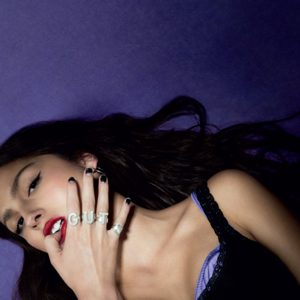The Disney Channel darling turned teen pop sensation brings a more mature sound to her sophomore album
By CLARA FISCHER — arts@theaggie.org
Olivia Rodrigo is growing up — and so is her music. The release of her debut album, “SOUR,” saw such immense success (the record garnered Rodrigo seven Grammy nominations, three wins and a full year in the top 10 of the Billboard Hot 100) that many were anxiously awaiting to see if her second album would live up to the first.
The good news? Rodrigo’s sophomore album, “GUTS,” delivers on the hype: the album performed as well — if not “a little bit better,” according to Billboard — on the charts as “SOUR” did. It’s a feat worth noting that Rodrigo was able to stay connected with fans during a two-year hiatus and come back as popular as the first time around.
“GUTS” starts off on a high note: “all-american bitch” is a powerful opener, with verses that sardonically affirm Rodrigo as the image of a typical all-American, girl-next-door idol and a contradicting chorus marked by aggressive electric guitar chords overlain with screams of exasperation. Rodrigo’s use of lyricism and production choices perfectly captures the impossibly contradictory expectations placed on young women in our society. The crowning moment in this song comes near the end, as Rodrigo liltingly laments, “I’m pretty when I cry.” This lyric succinctly captures the exhausting paradox of simply existing as a woman.
The next tracks, “bad idea right?” and “vampire,” were released as singles before the record dropped, and blend well with the album’s overall soundscape. “bad idea right?” is impossibly catchy and wouldn’t be out of place on the soundtrack of an early 2000’s Disney Channel movie, while “vampire” can be described as a more resentful “driver’s license.”
The fourth song on the album, “lacy,” stands out for its portrayal of jealousy. Rodrigo paints an image of a partner’s beautiful ex-lover, with hushed harmonies and a simple looped acoustic guitar giving way to a sweeping climax denouncing her “rotten mind for how much it worships [said ex-lover].” This track’s brilliance comes from its use of a relatively simple musical structure to depict a much more complicated feeling.
The next song, “ballad of a homeschooled girl,” is the quintessential depiction of teenage insecurity that so many of us are all too familiar with. With lyrics like “everything I do is tragic” and “each time I step outside/it’s social suicide,” it’s not hard to understand the point that Rodrigo is making. Though sure to be comforting to younger audiences who are struggling with the feelings Rodrigo describes, the lyrics are too on-the-nose to be impactful to me as an older listener.
“GUTS” hits a bit of a slump after the extreme angst of “ballad of a homeschooled girl.” The tracks “making the bed” and “logical” both explore feelings of self-doubt, delivered in ballads that showcase Rodrigo’s impressive vocal range. Unfortunately, both of these songs fall a bit flat. Belty anthems are familiar territory for Rodrigo, and neither “making the bed” nor “logical” offer anything significantly different from prior similar songs in her discography. Not to mention, the decision to place two significantly slower-paced songs back to back effectively stops the pace of the album in its tracks.
After this brief downturn, “GUTS” gets back in its rhythm with “get him back!” and “love is embarrassing.” Both records see Rodrigo move towards a resentful state of mind as she leans into a candid pop-rock expression of everything wrong with an unnamed ex-boyfriend. On “get him back!,” employs a stylized vocal technique that leans more toward speaking than singing in order to convey her frustration. “love is embarrassing,” on the other hand, is a more upbeat anthem declaring liberation from “some weird second-string loser who’s not worth mentioning.” As far as diss tracks go, it’s hard to find one in Rodrigo’s repertoire that will make you want to dance more.
The album ends on a high note with “the grudge,” pretty isn’t pretty” and “teenage dream.” These three work together to allow Rodrigo a final deep-dive into her adolescent anxieties. “the grudge” is a brutally honest representation of growing from conflict, and proves that Rodrigo has it in her to deliver a hard-hitting ballad that doesn’t feel contrived.
“pretty isn’t pretty,” on the other hand, is somewhat contradictory: the backing track is almost cheery, while the lyrics come across as a matter-of-fact documentation of self-esteem issues plaguing so many of us as we grow up.
Rodrigo closes out the album — and effectively, this era of her life — with “teenage dream.” The song feels like a final plea from the singer for the audience to empathize with her overwhelming doubts. She repeats the line, “They all say that it gets better, but what if I don’t?” until listeners are ushered out by an instrumental accompanying a spoken outro of Rodrigo talking with producer Dan Nigro and his baby. Choosing to close an album about the challenges of teenage girl-dom with a track ending in a conversation including a baby represents the skill Rodrigo possesses for story-telling; the theme of lost innocence is heard loud and clear.
Overall, “GUTS” is a relatively successful follow-up to an impactful debut. The singer-songwriter takes listeners on an intimate exploration of her experience as an adolescent woman coming of age — and she makes it clear that it isn’t always pretty.
Though at times “GUTS” feels more like a slightly older version of its little sister “SOUR” than an entirely independent record, Rodrigo’s brutally honest lyricism and witty wordplay combine beautifully with her skillfully woven vocals to result in an album that hits the mark for many listeners experiencing the tumultuous challenges of young adulthood for the first time.
Written by: Clara Fischer— arts@theaggie.org





